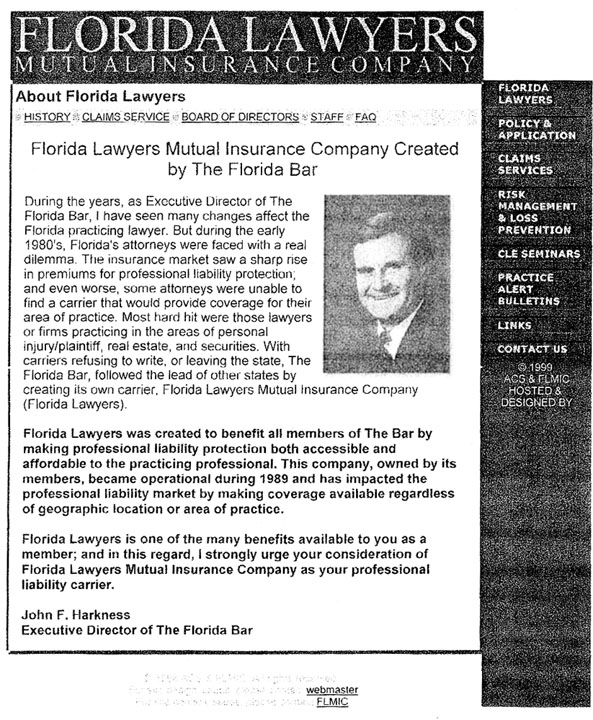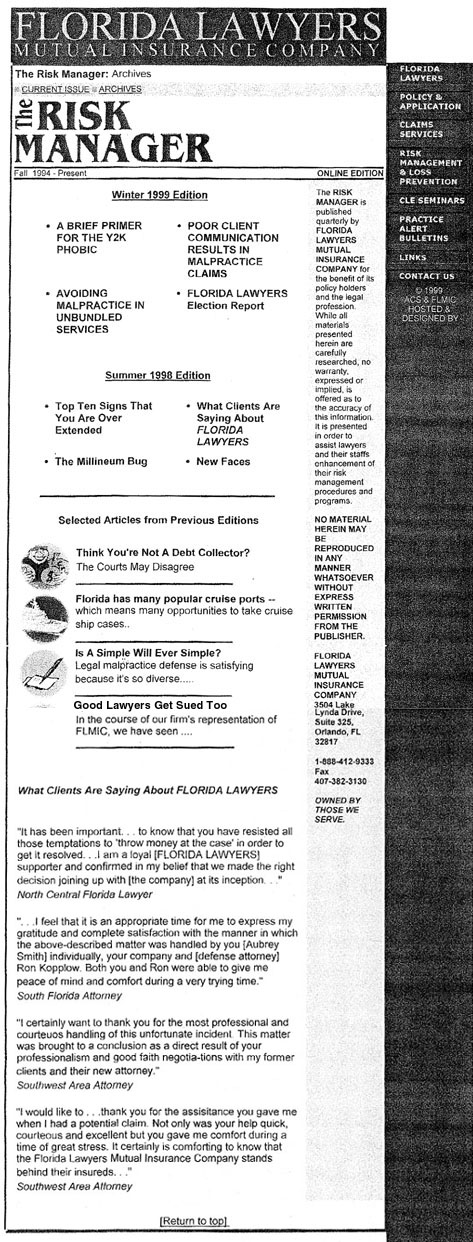

CERTIFIED MAIL -
RETURN RECEIPT REQUESTED
January 14, 2000
Honorable Major B. Harding
Chief Justice
Supreme Court of Florida
500 South Duval Street
Tallahassee, Florida 32399-1925
Dear Justice Harding,
I am presenting this to you as a citizen of the state of Florida, who is not an attorney, but has been wronged by attorneys. I hope that what I am presenting to you is clear and forgive me if I have not used the proper terminology or language although I have tried my hardest to do so.
Enclosed is documentation of the basis of my complaint against attorneys, Ronald C. Kopplow and Marc Cooper as presented to The Florida Bar in accordance with their prescribed method of filing a grievance. In addition I have provided you with a Chronology of Actions and a list of the standards which I believe these attorneys have violated.
Justice Harding, as you are aware, The Florida Bar is an arm of The Florida Supreme Court. The Florida Bar should be held to the highest standards of protection for the people and their rights. While there are numerous issues for you to review and understand, the most obvious issue that should have indicated to The Florida Bar investigator, which shows that this matter was not properly handled and certainly should have not been dismissed at an administrative level without a full investigation, is the clear Conflict of Interest that these attorneys had by the dual representation in the lawsuit. The Conflict of Interest of The Florida Bar as set forth in numbers 15 and 16 in the Chronology of Actions, provides the only conceivable explanation as to the reason the Bar did not conduct an investigation by an independently appointed panel of the Supreme Court of Florida.
Thank you for taking the time to hear my story and I look forward to your response.
Respectfully submitted,
Meryl M. Lanson
Encl.
January 14, 2000
Chronology of Actions
1) In June, 1998 I consulted with attorneys with regard to a potential legal malpractice lawsuit against attorneys, Ronald C. Kopplow and Marc Cooper (copy of our Complaint is attached).
2) After being advised that what I was pursuing was a viable action against my former attorneys, I was also advised that separate and apart from the lawsuit, The Florida Bar should be made aware of the unethical behavior of the attorneys in question.
3) I then contacted The Florida Bar and asked them to mail me the brochure which explains the procedure in filing a complaint against a Florida lawyer. (See Section 5 Purple)
4) I read the brochure in addition to the entire Florida Standards for Imposing Lawyer Sanctions. I believe that these attorneys were in violation of several Standards as imposed by The Florida Bar.
5) On July 21, 1998, I filed a Complaint as instructed by The Florida Bar’s brochure. (See Section 1 Yellow )
6) An inquiry was then initiated by Assistant Staff Counsel, Cynthia Lindbloom, of The Florida Bar’s Miami branch.
7) In August 1998, the attorneys in question responded to my Complaint. (See Sections 2 Orange and 3 Red)
8) On September 14, 1998 I hand delivered to The Florida Bar, Miami branch, my response to said attorneys responses. (See Section 4 Rose)
9) On December 8, 1998, Ms. Lindbloom responded in a two paragraph letter " that no violations as per The Florida Bar rules were committed by these attorneys".
10) I then contacted Ms. Kathi Lee Kilpatrick, Assistant Director-Lawyer Regulations in Tallahassee, Florida. Ms. Kilpatrick explained the chain of command within The Florida Bar and suggested I contact Ms. Arlene Sankel, Branch Manager of The Florida Bar’s Miami office.
11) On March 22, 1999 I sent Ms. Sankel a letter as per Ms. Kilpatrick’s suggestion.
12) On April 5, 1999 Ms. Sankel responded to me. Ms. Sankel advised me in that letter "that The Florida Bar Board of Governors recently approved an amendment to us standing board policy stating that in the absence of specified exceptions, isolated instances of malpractice and/or incompetent representation will not be pursued under the disciplinary system." I would like to mention that nowhere in the brochure "Filing a Complaint against a Florida Attorney" does it mention the Board of Governors "new policy". As a matter of fact it clearly states that any civil remedies should be pursued through the Court’s and that a disciplinary action will not provide for restitution. We have filed a civil lawsuit against these attorneys which according to the Florida Bar is separate and distinct from filing a complaint against a Florida Attorney. To quote directly from The Bar’s own pamphlet, section - What is the Purpose of the Lawyer Grievance System? Paragraph 3 "Further,any loss the client may have sustained as a result of the matter involved cannot be recovered through disciplinary proceedings. The lawyer may be punished, but if the complaining person has suffered a financial or property loss, that person’s rights must be enforced by usual legal methods against the person responsible for the loss."
13) As per Ms. Kilpatrick’s information regarding the "chain of command" I then forwarded the entire binder (approximately 500 pages spanning from July 21, 1998 to May 14, 1999) to Ms. Kilpatrick, Assistant Director - Lawyer Regulations, Mr. Bill Hendrix, Director - Lawyer Regulations, Mr. Tony Boggs, Director - Legal Division and Mr. John Harkness, Executive Director of The Florida Bar. I sent each binder individually to their Tallahassee office and I received signed receipts of their delivery.
14) On June 18, 1999 I received a letter from Ms. Kilpatrick informing me "that I will no longer be receiving any communication with regard to this Complaint from The Florida Bar".
15) In spite of Ms. Kilpatrick’s response, I continued to pursue my Complaint and in so doing I discovered that the Bar failed to disclose to me, at the inception of my complaint, their absolute direct conflict in ruling upon the disciplinary action based on their relationship with Florida Lawyers Mutual Insurance Company, a NABRICO insurance company (National Association of Bar Related Insurance Companies) the insurance carrier created and formed by The Florida Bar.
16) The Florida Bar interfered with my civil rights by not disclosing to me that these attorneys are not only insured by Florida Lawyers Mutual Insurance Company, the company "created and formed by The Florida Bar" but that Mr. Kopplow also has been employed as a defense attorney for Florida Lawyers Mutual Insurance Company, representing attorneys in legal malpractice actions.
These attorneys have violated the following Standards:
4.3 Failure to Avoid Conflicts of Interest
4.31 - Disbarment is appropriate when a lawyer, without the informed consent of the client (s): (a) engages in representation of a client knowing that the lawyer’s interests are adverse to the client’s with the intent to benefit the lawyer or another, and causes serious or potentially serious injury to the client; (b) simultaneously represents clients that the lawyer knows have adverse interests with the intent to benefit the lawyer or another, and causes serious or potentially serious injury to a client;
4.4 Lack of Diligence
4.41 - Disbarment is appropriate when: (b) a lawyer knowingly fails to perform services for a client and causes serious or potentially serious injury to a client; or (c) a lawyer engages in a pattern of neglect with respect to client matters and causes serious or potentially serious injury to a client.
4.5 Lack of Competence
4.51- Disbarment is appropriate when a lawyer’s course of conduct demonstrates that the lawyer does not understand the most fundamental legal doctrines or procedures, and the lawyer’s conduct causes injury or potential injury to a client.
4.52 - Suspension is appropriate when a lawyer engages in an area of practice in which the lawyer knows he or she is not competent, and causes injury or potential injury to a client.
4.6 Lack of Candor
4.61 Disbarment is appropriate when a lawyer knowingly or intentionally deceives a client with the intent to benefit the lawyer or another regardless of injury or potential injury.
4.62 Suspension is appropriate when a lawyer deceives a client, and causes injury or potential injury to the client.
6.0 Violations of Duties Owed of the Legal System
6.1 -False Statements, Fraud and Misrepresentation
6.11- Disbarment is appropriate when a lawyer: (a) with the intent to deceive the court, knowingly makes a false statement or submits a false document; or (b) improperly withholds material information, and causes serious or potentially serious injury to a party, or causes a significant or potentially significant adverse effect on the legal proceeding.
6.12 Suspension is appropriate when a lawyer knows that false statements or documents are being submitted to the court or that material information is improperly being withheld, and takes no remedial action.
7.0 Violations of Other Duties Owed as a Professional
Absent aggravating or mitigating circumstances and upon application of the factors set out in Standard 3.0, the following sanctions are generally appropriate in cases involving false or misleading communication about the lawyer or the lawyer’s services, improper communication of fields of practice, improper solicitation of professional employment from a prospective client, unreasonable or improper fees, unauthorized practice of law, improper withdrawal from representation, or failure to report professional misconduct.
7.1 Disbarment is appropriate when a lawyer intentionally engages in conduct that is a violation of a duty owed as a professional with the intent to obtain a benefit for the lawyer or another, and causes serious or potentially serious injury to a client, the public, or the legal system.
7.2 Suspension is appropriate when a lawyer knowingly engages in conduct that is a violation of a duty owed as a professional and causes injury or potential injury to a client, the public, or the legal system.

